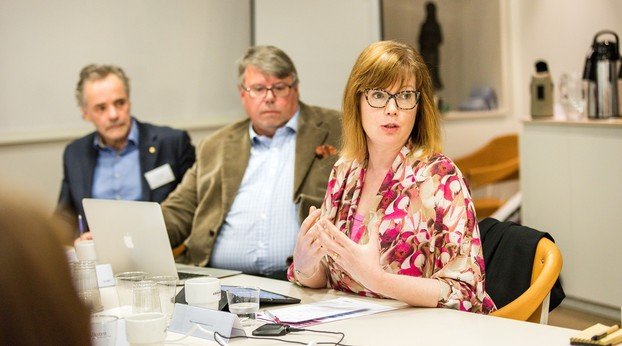Strengthening and developing healthcare science

The future of healthcare science was the topic of discussion at a roundtable meeting held at Karolinska Institutet on 7 May, when deans, healthcare scientists, politicians, patient representatives and healthcare providers gathered to discuss what needs to be done to secure the quality of healthcare science.
A Swedish Research Council report shows that healthcare science in Sweden maintains world-class standards, and according to a 2018 ranking, nursing research at Karolinska Institutet (KI) tops the list in Sweden, is third in Europe and is eleventh in the world.
But the challenges facing healthcare science are many, hence the discussion, initiated by the management of the healthcare science Strategic Research Area, which is jointly run by KI and Umeå University. Journalist Marianne Rundström was moderator at the meeting, which produced some practical suggestions for improving the conditions of healthcare science.
The group discussed the need to develop communication and implementation in healthcare research and to strengthen the academy-clinic partnership. PhDs are to be attracted back into healthcare by being offered more advanced responsibilities in keeping with their scientific competence, and clearer career paths must be created in both the healthcare and academic sectors.
 “KI will be advertising professorships in strategic areas, of which healthcare science is one,” said Anders Gustafsson, Dean of Research at KI. “Since a majority of healthcare scientists are women, this will also help us reach the 60 per cent target in terms of the proportion of women amongst newly appointed professors.”
“KI will be advertising professorships in strategic areas, of which healthcare science is one,” said Anders Gustafsson, Dean of Research at KI. “Since a majority of healthcare scientists are women, this will also help us reach the 60 per cent target in terms of the proportion of women amongst newly appointed professors.”
The discussion also addressed exposing status disparity between different research disciplines. Assessment criteria and processes commonly take a biomedical perspective, at the expense of healthcare science.
Jan Hillert, R&D director at Karolinska University Hospital, held that both students and staff active in healthcare must become better at measuring and analysing results and quality in order to enhance the “value” of healthcare science and practice.
“Joint appointments are the right way to go, and KI’s managers should take care to ensure that doctoral students and researchers do both clinical and academic work,” said Mikael Ohrling, hospital director for the Stockholm County healthcare area.
Anna Starbrink (L), the county council’s Executive Member for Healthcare, said that the great potential for affecting the future of healthcare science lay in revising the council’s strategy along with KI.
The benefits of healthcare science
Two examples of high quality healthcare science at KI that have benefited patients are the MIMA model, which is used to reduce postnatal injury, and the DöBra-programme, a national research programme focussing on dying, death and grieving.
Text: Anna-Maria Loimi and Sabina Bossi
Photo: David Lagerlöf
